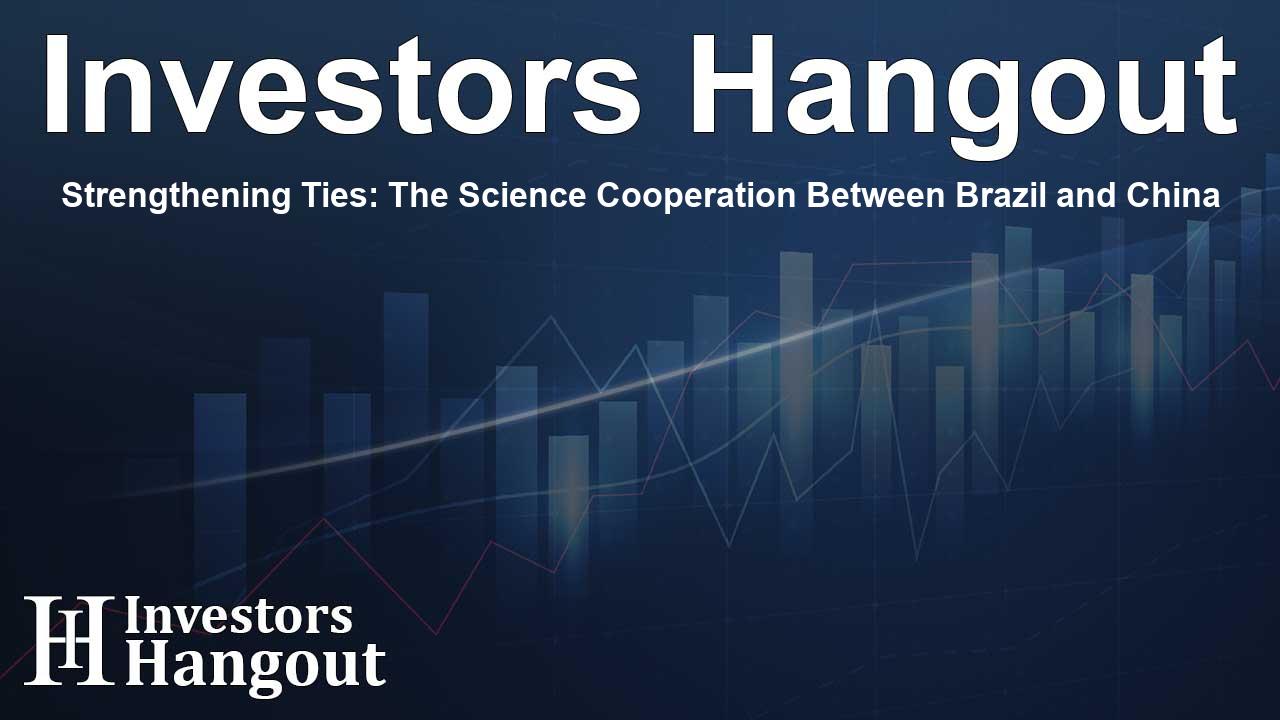Strengthening Ties: The Science Cooperation Between Brazil and China

Strengthening Ties: The Science Cooperation Between Brazil and China
In recent years, international scientific cooperation has flourished, with significant examples emerging from the partnerships formed between countries like Brazil and China. Renowned Brazilian scientist Dr. Juan Carlos Mateus Sanchez has been at the forefront of this collaboration, having initially embarked on a transformative research journey in China.
An Opportunity That Changed Everything
Dr. Sanchez, a researcher at Brazil's National Institute of Metrology, Quality and Technology (INMETRO), accepted an opportunity to conduct research at a leading Chinese institution. His decision in 2019 marked the beginning of a collaborative effort that would not only benefit his career but also contribute to the deeper scientific ties between Brazil and China.
Establishing Key Collaborations
Over the years, the collaborative spirit has surged as scientific and technological relations between Brazil and China have thrived. This partnership has emerged as a remarkable model of South-South cooperation, encouraging mutual growth through knowledge exchange and technological innovation.
Part of this cooperation involved signing a memorandum of understanding between NIM (National Institute of Metrology) in China and INMETRO in Brazil, emphasizing priority areas like electromagnetic compatibility (EMC). This agreement served as a cornerstone for Dr. Sanchez's research efforts, allowing him to engage deeply with his Chinese counterparts, including his mentor, Dr. Meng Donglin.
Innovative Research and Development
During his time at NIM, Dr. Sanchez worked on developing an innovative E-field sensor probe, which he has termed his most significant achievement. This endeavor involved close scrutiny of the differences in electric field measurements across various laboratories in both Brazil and China.
A Team Effort
With the support of his mentor, Dr. Meng, Sanchez navigated technical challenges that accompanied the development process. By securing funding and utilizing state-of-the-art resources from NIM, the research team successfully designed a device that filled existing gaps in Brazil's measurement capabilities. This improved not only scientific accuracy but also significantly enhanced the quality of products manufactured in Brazil.
A Lasting Relationship Built on Trust
Dr. Sanchez speaks highly of the support he received from his Chinese colleagues, underscoring the importance of friendship and trust in fostering international collaboration. The sense of community he experienced during his stay helped him adjust to life in Beijing, reinforcing the value of both personal and professional connections.
The camaraderie established during this time proved essential, especially during challenging periods such as the COVID-19 pandemic when his colleagues ensured food and supplies reached him and his family.
Looking Ahead: The Next Era of Cooperation
In more recent developments, Dr. Sanchez has returned to NIM, aiming to further solidify the relationship between NIM and INMETRO. Both nations have enjoyed over half a century of diplomatic ties, with Brazil being a pioneer in working with China in cutting-edge technological fields such as the joint development of satellites.
This extensive collaboration has yielded valuable benefits, as data from these earth-resources satellites continues to support various sectors including agriculture and environmental management in both countries.
Building on Mutual Understanding
Institutions like the China-Brazil Center for Climate Change and Innovation in Technology are pivotal in sustaining this partnership, enabling ongoing joint research initiatives. Experts emphasize that the foundation for successful collaboration relies on political trust and mutually beneficial economicdevelopment strategies.
Frequently Asked Questions
Why is the partnership between Brazil and China significant?
The partnership illustrates a successful model of international scientific collaboration, promoting technological advancement and mutual growth.
What role did Dr. Juan Carlos Mateus Sanchez play in this cooperation?
Dr. Sanchez was instrumental in developing measurement technologies that enhance accuracy and quality in Brazil's industrial capabilities.
How did Chinese colleagues support Dr. Sanchez?
His colleagues provided essential support for adapting to life in China and collaborative research, fostering strong personal connections along the way.
What future initiatives are planned in this collaborative relationship?
Ongoing initiatives will focus on expanding research cooperation in various scientific fields, particularly in areas that address common challenges.
How can Brazil and China further strengthen their ties?
By continuing to engage in joint projects and sharing knowledge, both countries can mutually benefit from each other's experiences and innovations.
About Investors Hangout
Investors Hangout is a leading online stock forum for financial discussion and learning, offering a wide range of free tools and resources. It draws in traders of all levels, who exchange market knowledge, investigate trading tactics, and keep an eye on industry developments in real time. Featuring financial articles, stock message boards, quotes, charts, company profiles, and live news updates. Through cooperative learning and a wealth of informational resources, it helps users from novices creating their first portfolios to experts honing their techniques. Join Investors Hangout today: https://investorshangout.com/
Disclaimer: The content of this article is solely for general informational purposes only; it does not represent legal, financial, or investment advice. Investors Hangout does not offer financial advice; the author is not a licensed financial advisor. Consult a qualified advisor before making any financial or investment decisions based on this article. The author's interpretation of publicly available data shapes the opinions presented here; as a result, they should not be taken as advice to purchase, sell, or hold any securities mentioned or any other investments. The author does not guarantee the accuracy, completeness, or timeliness of any material, providing it "as is." Information and market conditions may change; past performance is not indicative of future outcomes. If any of the material offered here is inaccurate, please contact us for corrections.